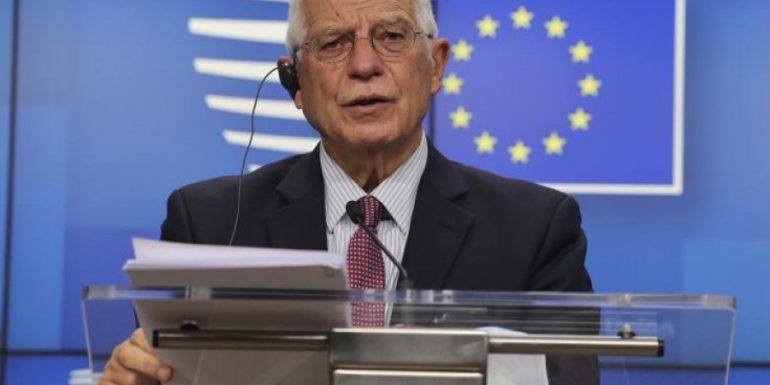The easing of tensions with Turkey in the Eastern Mediterranean during 2021, the relative stabilization in Libya and the need to bring the Mediterranean countries closer, notes among others the EU High Representative for Foreign Affairs and Security Policy Josep Borrell - review of last year on his official blog.
"The situation in Libya seems to have stabilized, with elections postponed again, and tensions with Turkey in the Eastern Mediterranean tend to ease this year," Borrell said.
"The recent Regional Forum for the Union for the Mediterranean and the EU-Southern Neighborhood Ministerial Meeting in Barcelona in late November also reminded us of the urgent need to close the growing gap between the two Mediterranean coasts and seize new opportunities. , for example in relation to the green transition "is added to the post.
The 2021 review covers all aspects of EU foreign policy, with Mr Borel noting that 2021 is a year of transition.
"Geopolitical changes have intensified as global balances of power pose ongoing challenges to the EU and its values. "We have to respond with all the determination we have," he added.
Among other things, Mr. Borel referred to the ongoing challenges posed by the pandemic and the return of restrictions due to the Omicron variant, noting, however, that the majority of Europeans have now received at least two doses, while the EU continues to export vaccines.
However, he added, "the unequal rate of vaccination from continent to continent underscores the need to accelerate donations and develop local vaccine production capacity, especially in Africa."
He notes that while 60% of the total population in the EU is fully vaccinated (68% in the EU), the corresponding figure is 61% in South America, 56% in North and Central America and the Caribbean, 57% in Oceania. in Asia at 53% and in Africa at only 8%.
The pandemic has also hampered the efforts of the developing world, as it has led to rising hunger and poverty worldwide, with 150 million people falling below the poverty line due to the pandemic, according to the World Bank. Mr. Borrell.
According to the High Representative, the world is facing one crisis after another, "with Belarus, Ukraine, Mali, Sudan, Afghanistan, Ethiopia and Venezuela dominating the international and European agenda," he said.
"The fact that we are constantly in a state of crisis management has in some cases weakened our ability to address horizontal, long-term issues that should be at the heart of our foreign policy, such as reviving multilateralism or managing migration in a balanced way. "or the energy and climate crisis or the rules for the digital transition."
Referring to the positive developments of 2021, Mr. Borel emphasized the presentation of the EU Compass Strategy in the Member States, with a view to strengthening the EU's role as a "security provider", although the EU "does not aim to become a military force with in the traditional sense, but we need to be able to better defend ourselves. "
He also referred to the EU leadership at the COP26 climate summit in Glasgow, as well as the resurgence of relations with the United States since Joe Biden took office, which has led to progress in the climate debate, Iran's nuclear program and the business taxation.
Although, as he notes, the US handling of the withdrawal from Afghanistan and the decision on the AUKUS alliance was unfortunate, the EU and the US entered into a close dialogue on relations with China and agreed to enter into a dialogue on security and defense.
In his extensive report on the Eastern Neighborhood, Mr Borrell cites clear examples of policies in force in 2021, such as in Ukraine, Belarus and Moldova, with particular reference to EU political and operational support to its partners, such as through sanctions against the Lukashenko regime.
"As hybrid conflicts escalate, we must continue to support Ukraine or Moldova in resisting pressure from Russia and taking a firm stand against Belarus," Borrell said, adding that the Eastern Partnership Summit strategic approach to the region.
Special mention is still made of the divisive rhetoric in the Western Balkans, and especially in Bosnia and Herzegovina, a rhetoric that hinders efforts to bring the six countries "closer to their European future".
With regard to China, the High Representative stressed that the EU has maintained its unity vis-.-Vis the country, which it considers "a partner, a competitor and a systemic adversary at the same time." In 2021, the deteriorating human rights situation inside the country, its behavior in the region, sanctions against MEPs and other EU institutions and, more recently, its coercive attitude towards Lithuania have affected relations, he added.
The EU has focused on expanding relations with countries across the Indo-Pacific region, adopting a new strategy of boosting trade and investment, as well as greater security cooperation, including through maritime security and cybersecurity.
Regarding Africa, Mr. Borel writes that the year was marked by conflict and the deterioration of the situation in the Sahel, emphasizing that the civil war in Ethiopia "has taken on dramatic proportions", and refers to the preparation of the summit with the African Union where it is expected to discuss EU support for vaccines and climate finance.
Regarding relations with Latin American countries, Mr. Borel spoke of increasing contacts, including with his visit to Brazil, the first visit of a high-ranking official to the country in nine years.
Source: KYPE
